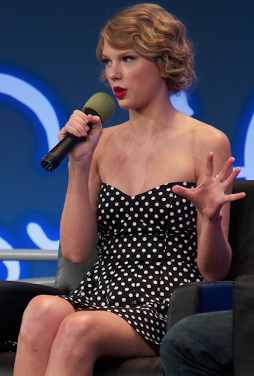Anonymous contribution
What are your views on wearing makeup?
- It’s symptomatic of a culture where women are taught to be valued for their appearance and I refuse to give my money to an industry that profits off of women’s insecurities
- It’s a form of self-expression and art and I should be allowed to subvert beauty ideals with green eyebrows and black lipstick on
- There’s nothing wrong with wanting to look conventionally beautiful so long as I’m self-aware; I will put makeup on if I want to
How about your views on Taylor Swift’s music?
- I think a lot of her lyrics are problematic and, thus, I don’t really want to listen to her music
- She’s human and she’s still learning – I won’t listen to her earlier work but I like the turn she’s taken since learning about what feminism means
- Her songs are catchy and fun and I genuinely enjoy listening to them. I don’t think it’s possible to listen to music that’s truly non-problematic anyway
Finally, would you ever be a stay-at-home parent?
- Not a chance. The glass ceiling isn’t going to break itself.
- It really depends on the sort of partner I’m with or whether I have a partner at all. I can’t really give you an answer without context.
- If I had kids, I would love to be able to stay at home to bring them up. You don’t have to be a career woman to be empowered.
What if I told you that you had to pass the above test to confidently call yourself a feminist?
 Luckily, and perhaps frustratingly for people looking for easy answers, every response in this test is valid. One of the dilemmas that new feminists run into early on is that of trying to reconcile their lifestyle choices with their philosophy. These range from the mundane (is it alright if I enjoy James Bond movies?) to the more definitive (can I take my husband’s last name after we get married?). What remains the same, though, is the idea that a basket of lifestyle choices can make or break one’s identity as a feminist.
Luckily, and perhaps frustratingly for people looking for easy answers, every response in this test is valid. One of the dilemmas that new feminists run into early on is that of trying to reconcile their lifestyle choices with their philosophy. These range from the mundane (is it alright if I enjoy James Bond movies?) to the more definitive (can I take my husband’s last name after we get married?). What remains the same, though, is the idea that a basket of lifestyle choices can make or break one’s identity as a feminist.
The assumption undergirding this way of thinking is that feminism is a homogenous movement. It is not. Going by the basic understanding that feminism’s goal is to achieve gender equality for all, we need to appreciate that there are many means to that end. Feminists straddle many different identities – they differ in sexuality, class, race and many other lines. It makes sense then that such a diverse group of people would have dissimilar and, occasionally contradictory, approaches to fighting for gender equality.
 There are two implications of this realisation; the first is that the burden of being the “model feminist” is lifted off the individual. All too often, new feminists feel the pressure of setting an example of what it means to believe in gender equality through their actions and end up feeling conflicted because there is no straightforward answer to be found. The second is that, amidst our inevitable disagreements, there is little point in quarrelling about what is or is not “feminist enough”. News now travels at the speed of light and every action or word from a famous woman is sufficient fodder for a thousand think pieces. There is merit in having conversations like this however they shouldn’t be definitive.
There are two implications of this realisation; the first is that the burden of being the “model feminist” is lifted off the individual. All too often, new feminists feel the pressure of setting an example of what it means to believe in gender equality through their actions and end up feeling conflicted because there is no straightforward answer to be found. The second is that, amidst our inevitable disagreements, there is little point in quarrelling about what is or is not “feminist enough”. News now travels at the speed of light and every action or word from a famous woman is sufficient fodder for a thousand think pieces. There is merit in having conversations like this however they shouldn’t be definitive.
Once we accept the plurality of the feminist experience, we open ourselves up to the opportunity to learn about feminists from all walks of life are resisting oppression and creating a better world to live in.
